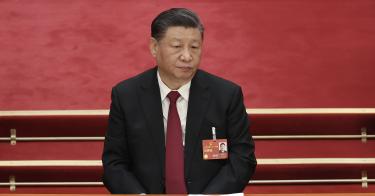Chinese leader Xi Jinping is expected to increase his already unassailable power after his country’s rubber-stamp legislature, the National People’s Congress, convenes Sunday.
The gathering represents the most important political event in Beijing since October’s National Congress of the Chinese Communist Party, held every five years, which saw Xi consolidate his control over the party and become the most powerful Chinese leader since Mao Zedong.
The legislative session that opens Sunday will enable Xi to finish the job by consolidating his control over China’s government institutions.
China’s legislature meets for one or two weeks each spring to outline the nation’s policy direction and set economic targets for the year ahead. With this session being the first since last fall’s party congress, it has the added role of installing new government leaders and announcing a restructuring of state institutions, which is expected to be extensive.
Most decisions that will be announced were made in advance by top Chinese Communist Party leaders in closed-door meetings. The agenda was finalized earlier this week at the second plenary session of the CCP Central Committee, a group of over 300 of the most senior party officials. For this reason, observers will closely monitor the session for any indication of a change in Xi’s standing.
This year’s legislative session comes at a critical time for China. The past four months have seen nationwide protests and a public health crisis caused by the sudden abandonment of Xi’s signature “zero-COVID” policy. They also witnessed growing economic headwinds, from skyrocketing local government debt and youth unemployment to a near-collapse of the housing market.
The Chinese Communist Party’s stubborn insistence on draconian “zero-COVID” lockdowns through most of 2022 resulted in the government’s reporting just 3% growth in gross domestic product. This likely-inflated figure is a far cry from the goal of 5.5% growth announced at last year’s legislative session, and represents one of the worst annual growth rates reported since China began partially opening its economy in the late 1970s.
Xi’s role in these policy failures is no secret among China’s political elite and informed public.
The unprecedented economic and social challenges facing China’s leadership almost certainly will be a central focus of the legislative session. China watchers will parse outgoing Premier Li Keqiang’s work report for indications of how the Chinese government aims to address these issues.
Of particular interest will be the economic growth target, which likely will be set at somewhere between 5% and 6%. The government rarely sets targets it doesn’t expect to meet. Thus, a 6% target would indicate that the government is confident the worst of the economic troubles are behind it.
Independent of the policy takeaways, all indications are that the challenges facing China have not had any significant impact on Xi’s standing within the Chinese Communist Party.
Indeed, Xi’s preeminent role and the need for government officials to rally around his leadership were central themes of the communique released following the Central Committee’s plenum last month. This communique, as well as other clues from recent state media discourse, indicate that Xi’s power will be consolidated further during the legislative session.
One way Xi will consolidate power is through personnel appointments. Those appointed during the legislative session will be responsible for overseeing the government’s day-to-day operations.
Although the Chinese Communist Party sets high-level priorities, it is up to government organizations to develop and implement the specific policies designed to achieve the party’s objectives. For this reason, the personalities and political loyalties of those leading government institutions have significant implications for Xi’s ability to push through his agenda.
The legislative session almost certainly will see Xi reappointed to a third term as China’s president, following his reappointment to the more important roles of CCP general secretary and Central Military Commission chairman during the party congress.
In addition, one of his closest confidants, Li Qiang, will be appointed as premier, and many of the vice premiers, state councillors, and heads of key ministries and departments are likely to be Xi loyalists. Essentially, the most senior of these appointments were locked up at the party congress in October and would be difficult to change even if powerful voices within the CCP wanted to dissent.
A second way Xi is set to strengthen his grip on China is through institutional restructuring. It is common for some degree of reorganization to occur at the legislative session after a party congress, but the changes likely will be particularly notable this time around.
State-run media report that a “wide-ranging” restructuring of China’s government and party organizations will occur. While details are few, what little has been revealed indicates that the reorganization will strengthen the Chinese Communist Party’s control over the government. As the strongest CCP leader in decades, Xi stands to be the primary beneficiary of every step toward greater party control over the bureaucracy.
Ultimately, the personnel appointments, institutional restructuring, and policy direction announced during the annual legislative session will help to operationalize the CCP-centric vision Xi presented during last year’s party congress.
Contrary to the expectations of some, and the hopes of many, Xi will emerge from this session even more powerful than he already is.
This piece originally appeared in The Daily Signal



